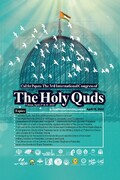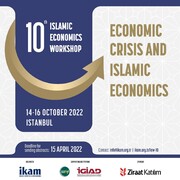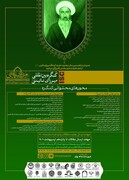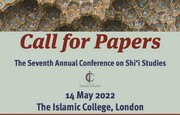Hawzah News Agency- The first of Al-Mahdi Institute’s International inaugural Qur’ānic Studies Conference offers a dynamic forum for scholarly dialogue on the regulative verses. The main objective of the conference is to provide an intellectual opportunity for cutting-edge, academic research on various aspects of the regulative verses of the Qur’ān and their impact on Muslim religious life. The result of this conference shall be an edited volume which all presenters shall be expected to contribute to. The conference will be taking place on 27–28 April 2023. The deadline for the call for papers is 25 November 2022.
About the Conference
The Qur’ān is the most important text regulating various aspects of a Muslim’s life, containing numerous rules of conduct and an even greater number of normative ideas. Although details of the Islamic norms are usually derived from other sources, the centrality of the Qur’ān as a fundamental source of legal, quasi-legal and ethical norms cannot be underestimated. Regulative verses of the Qur’ān (āyāt al-aḥkām) not only include devotional duties, such as ablution before prayer, prayer, fasting during the month of Ramadhan and pilgrimage, but also regulate a wide range of non-devotional individual, communal and social
conducts. These include, inter alai, dietary norms, penal law, commercial law, norms related to a Muslim’s status, interfaith relationships and war.
Whether the Qur’ān is a legal text or whether God presents Himself as a lawmaker in the Qur’ān is not just a legal-theological question, it prompts deep hermeneutical inquiries about the nature of the regulative verses of the Qur’ān. Who are the addressees of the regulative verses? How did the audience of the Qur’ān receive regulative verses? No profound hermeneutical inquiries about regulative verses can, however, be done without deep historical research into them. Muslim receptions of regulative verses are also not merely jurisprudential and theological questions; they are genuine anthropological, sociological, and political issues attracting inductive inquiry from researchers.
Four major questions seem to loom large for all those researching the regulative verses of the Qur’ān:
- Is it possible to systematise the regulative verses of the Qur’ān without resorting to the already well-developed body of fiqhī and hadīthī literature?
- What hermeneutical strategies have Muslim scholars adopted to reconcile between the regulative
verses of the Qur’an and the plethora of fiqhī and hadīthī requirements? - How seriously should the biblical, post-biblical, Arabian, Persian and Roman legal norms be taken for a
deeper understanding of the regulative verses of the Qur’ān? - What is the actual impact of regulative verses in a Muslim’s life?
This conference is organised by Al-Mahdi Institute in collaboration with AMI Press.
Call for papers – Points to consider
Applicants are invited to consider the following areas for the presentations and papers:
- Is the Qur’ān a legal text? Does God present Himself as a lawmaker in the Qur’ān?
- Hermeneutical aspects of the regulative verses of the Qur’ān
- Abrogation and its adjacent hermeneutical notion in the Qur’ān
- Form and essence in the regulative verses
- Historical aspects of the regulative verses
- Normative characteristics of the makkī and madanī legislative verses?
- When did Muslim conceptualise the category of “āyāt al-aḥkām”?
- Bibliographical inquiries on regulative verses
- Who are the addresses of the legislative verses?
- How the audience of the Qur’ān received āyāt al-aḥkām
- Reception of āyāt al-ahkām by Muslim scholars (classical, contemporary) and orientalists
- Contemporary perception of Qur’ānic rules of conduct
- Muslim general public’s perception of the regulative verses (anthropological, sociological, ethical, political etc.)
- Non-Muslim general public’s perception of the regulative verses (anthropological, sociological, ethical, political etc.)
- Contemporary perception of Qur’ānic rules of conducts
- Biblical norms and the legislative verses
- Canon law and legislative verses.
- Personal status (family law, child adoption, will, inheritance etc.), criminal law and economic questions in legislative verses.
- Interfaith relation, war, and peace in the regulative verses of the Qur’ān.
Shortlisted abstracts are expected to be developed into a full academic paper. Upon successful completion of all publication requirements, contributors will be awarded an honorarium. Al-Mahdi Institute will cover all reasonable travel and accommodation costs. The proceedings of the conference will be published in the form of an edited book in 2024. The language of the conference (and published papers) will be English only. The conference will run over two days, each having 6–8 papers, and includes hospitality. Each paper should last no more than 20 minutes.
All presenters are required to stay for the full two days.
Schedule for Submissions
- Abstracts: The deadline for abstracts is Friday, 25 November 2022. Abstracts should:
- be 300–500 words;
- submitted along with a CV (maximum 2 pages, with a listing of the applicant’s publications and recent work experience) in either MS Word or PDF format;
- include a short biography of themselves;
- emailed to fatemim@almahdi.edu
- Shortlisting Abstracts: Abstracts shortlisted for the conference will be notified by Monday, 5th of December 2022.
- Conference: Selected abstracts will be invited for a two-day conference from Thursday 27 April to Friday 28 April 2023 at Al-Mahdi Institute, 60 Weoley Park Road, Selly Oak, Birmingham B29 6RB. The conference co-ordinator will arrange travel and accommodation.
- Full papers: Final papers must be submitted by Friday, 25 August 2023. Papers should:
- be presented in line with the house style of AMI Press;
- have a word count between 6,000–10,000 words maximum, excluding bibliography;
- emailed to fatemim@almahdi.edu
- Review: Authors should review the editor’s comments and recommendations and resubmit articles with appropriate changes. The outcome of the editor’s review will be communicated to the authors by Friday, 25 November 2023.
- Copyediting: The copyeditor will edit your paper and standardise it to match the AMI Press house style. Your copyedited paper will be sent to you by Thursday, 25 January 2024.
- Final paper: Any final amendments to papers should be submitted by Sunday, 25 February 2024.
- Publication: The edited volume is scheduled for publication in March 2024.
Submission of Abstracts
An abstract of no more than 500 words should be submitted in the form of a MS word document or PDF attached to Professor Seyed Fatemi at fatemim@almahdi.edu by 17:00 UK time on Friday, 25 November 2023. Applicants should kindly submit a CV with a listing of publications and recent affiliation history.
Submissions Process (Full papers)
Full papers should be submitted in the form of an MS Word document attached to an email to fatemim@almahdi.edu no later than 17:00 UK time, Friday 25 August 2023. The first page of the manuscript should contain the following:
- The title
- The name(s) and institutional affiliation of the author(s)
- Short biography
- The address, telephone, and email address of the corresponding author(s)
- An abstract of 300-500 words maximum
- A bibliography
- 6 keywords.


















Your Comment